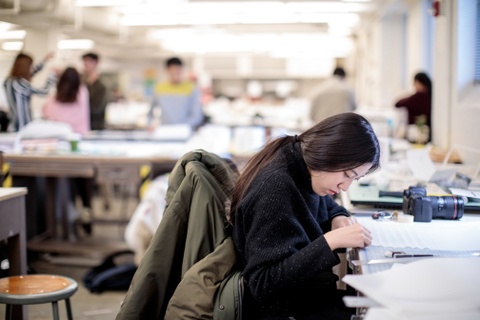Facilities
Nancy Spirtas Kranzberg Studio for the Illustrated Book
A collaboration with WashU Libraries, the Book Studio is a working book and print production facility.
The Sam Fox School supports an interdisciplinary approach to studio practice. Students are encouraged to create and develop new skills as makers and thinkers. The Sam Fox School has a variety of specialized facilities, such as shops, labs, and studios, to support this mission. The primary purpose of these specialized facilities is to support Sam Fox School students and students enrolled in Sam Fox School courses. Studio, shop and lab access is limited to those taking courses in the Sam Fox School. Sam Fox School faculty, Sam Fox visiting faculty, and WashU faculty working on a collaborative project with Sam Fox School may have access to these facilities outside of coursework for research and creative practice with prior approval from the program directors and the Office of the Dean.
For more details, please visit Inside Sam Fox.
Studio Spaces
See where you'll work
Student studio spaces are located in close proximity to resources for making and learning, including shops and spaces for installation, pin-ups, and critiques. Students from various programs and levels work in close proximity to one another, promoting cross-disciplinary exchange.
Shop Policies
Users with improper attire will be prohibited from working in the shop. For general work, wear close-toed shoes, tie back long hair, and do not wear loose garments. For hot work, you must have natural fiber clothing and sturdy leather boots.
Safety glasses and hearing protection are required for all. Regular eye glasses are not safety glasses, users with glasses must wear safety glasses over their frames or wear a face shield (prescription safety glasses available from an optometrist).
In order to use the equipment users must be trained by a qualified technician/faculty member. Monitors are not qualified to train users; however they may verify credentials, identify unsafe operations, and request that non-compliant users leave the shop.
Do not work in the shop under the influence of alcohol, or drugs (prescription or recreational). Do not work in a sleep-deprived state. If you shouldn’t be driving, you shouldn’t be working in the shop.
Only cut what needs to be cut, carefully avoiding limbs and appendages.
Stationary power tools may only be used when a monitor/technician/faculty member is present. When working after hours you should never work alone—always have a fellow Sam Fox School student present.
Do not bring food or drink into the shop. Carts/tables are available in the hallway to store your food and beverages.
Approach the shop as you would a potential risk. Be intentional with your movements, be mindful of your body, and take your time.
Sign in and out of the shop. Injuries and damaged equipment should be reported to the monitor/technician immediately. Come prepared with a sketchbook and something to write with.

















